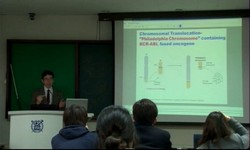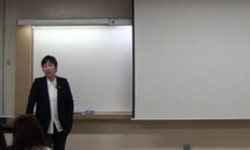The hydroxylation of estradiol results in the formation of catechol estrogens such as 2-hydroxyestradiol (2-OHE2) and 4-hydroxyestradiol (4-OHE2). These catechol estrogens are further oxidized to quinone metabolites by peroxidases or cytochrome P450 (...
http://chineseinput.net/에서 pinyin(병음)방식으로 중국어를 변환할 수 있습니다.
변환된 중국어를 복사하여 사용하시면 됩니다.
- 中文 을 입력하시려면 zhongwen을 입력하시고 space를누르시면됩니다.
- 北京 을 입력하시려면 beijing을 입력하시고 space를 누르시면 됩니다.
https://www.riss.kr/link?id=A106109513
- 저자
- 발행기관
- 학술지명
- 권호사항
-
발행연도
2019
-
작성언어
English
- 주제어
-
등재정보
KCI등재
-
자료형태
학술저널
- 발행기관 URL
-
수록면
1-6(6쪽)
-
KCI 피인용횟수
0
- 제공처
-
0
상세조회 -
0
다운로드
부가정보
다국어 초록 (Multilingual Abstract)
The hydroxylation of estradiol results in the formation of catechol estrogens such as 2-hydroxyestradiol (2-OHE2) and 4-hydroxyestradiol (4-OHE2). These catechol estrogens are further oxidized to quinone metabolites by peroxidases or cytochrome P450 (CYP450) enzymes. Catechol estrogens contribute to hormone-induced carcinogenesis by generating DNA adducts or reactive oxygen species (ROS). Interestingly, many of the natural products found in living organisms have been reported to show protective effects against carcinogenesis induced by catechol estrogens. Although some compounds have been reported to increase the activity of catechol estrogens via oxidation to quinone metabolites, many natural products decreased the activity of catechol estrogens by inhibiting DNA adduct formation, ROS production, or oxidative cell damage. Here we focus specifically on the chemopreventive effects of these natural compounds against carcinogenesis induced by catechol estrogens.
참고문헌 (Reference)
1 Mense SM, "Vitamin C and alpha-naphthoflavone prevent estrogen-induced mammary tumors and decrease oxidative stress in female aci rats" 30 : 1202-1208, 2009
2 Lareef MH, "The estrogen antagonist ici-182-780 does not inhibit the transformation phenotypes induced by 17-beta-estradiol and 4-oh estradiol in human breast epithelial cells" 26 : 423-429, 2005
3 MacLusky NJ, "The catechol estrogens" 15 : 111-124, 1981
4 Lehmann L, "Soy isoflavones decrease the catechol-o-methyltransferase-mediated inactivation of 4-hydroxyestradiol in cultured mcf-7 cells" 29 : 363-370, 2008
5 Takemura H, "Selective inhibition of methoxyflavonoids on human cyp1b1 activity" 18 : 6310-6315, 2010
6 Park SA, "Resveratrol suppresses 4-hydroxyestradiol -induced transformation of human breast epithelial cells by blocking ikappab kinasebeta-nf-kappab signalling" 46 : 1051-1057, 2012
7 Zhou X, "Resveratrol represses estrogen-induced mammary carcinogenesis through nrf2- ugt1a8-estrogen metabolic axis activation" 155 : 252-263, 2018
8 Lu F, "Resveratrol prevents estrogen-DNA adduct formation and neoplastic transformation in mcf-10f cells" 1 : 135-145, 2008
9 Chen ZH, "Resveratrol inhibits tcdd-induced expression of cyp1a1 and cyp1b1 and catechol estrogen-mediated oxidative DNA damage in cultured human mammary epithelial cells" 25 : 2005-2013, 2004
10 Zahid M, "Resveratrol and n-acetylcysteine block the cancer-initiating step in mcf-10f cells" 50 : 78-85, 2011
1 Mense SM, "Vitamin C and alpha-naphthoflavone prevent estrogen-induced mammary tumors and decrease oxidative stress in female aci rats" 30 : 1202-1208, 2009
2 Lareef MH, "The estrogen antagonist ici-182-780 does not inhibit the transformation phenotypes induced by 17-beta-estradiol and 4-oh estradiol in human breast epithelial cells" 26 : 423-429, 2005
3 MacLusky NJ, "The catechol estrogens" 15 : 111-124, 1981
4 Lehmann L, "Soy isoflavones decrease the catechol-o-methyltransferase-mediated inactivation of 4-hydroxyestradiol in cultured mcf-7 cells" 29 : 363-370, 2008
5 Takemura H, "Selective inhibition of methoxyflavonoids on human cyp1b1 activity" 18 : 6310-6315, 2010
6 Park SA, "Resveratrol suppresses 4-hydroxyestradiol -induced transformation of human breast epithelial cells by blocking ikappab kinasebeta-nf-kappab signalling" 46 : 1051-1057, 2012
7 Zhou X, "Resveratrol represses estrogen-induced mammary carcinogenesis through nrf2- ugt1a8-estrogen metabolic axis activation" 155 : 252-263, 2018
8 Lu F, "Resveratrol prevents estrogen-DNA adduct formation and neoplastic transformation in mcf-10f cells" 1 : 135-145, 2008
9 Chen ZH, "Resveratrol inhibits tcdd-induced expression of cyp1a1 and cyp1b1 and catechol estrogen-mediated oxidative DNA damage in cultured human mammary epithelial cells" 25 : 2005-2013, 2004
10 Zahid M, "Resveratrol and n-acetylcysteine block the cancer-initiating step in mcf-10f cells" 50 : 78-85, 2011
11 Yang L, "Reduced formation of depurinating estrogen-DNA adducts by sulforaphane or keap1 disruption in human mammary epithelial mcf-10a cells" 34 : 2587-2592, 2013
12 Zitka O, "Redox status expressed as gsh:Gssg ratio as a marker for oxidative stress in paediatric tumour patients" 4 : 1247-1253, 2012
13 Zahid M, "Prevention of estrogen-DNA adduct formation in mcf-10f cells by resveratrol" 45 : 136-145, 2008
14 Mense SM, "Preferential induction of cytochrome p450 1a1 over cytochrome p450 1b1 in human breast epithelial cells following exposure to quercetin" 110 : 157-162, 2008
15 Wagner J, "Phytoestrogens modulate the expression of 17alpha-estradiol metabolizing enzymes in cultured mcf-7 cells" 617 : 625-632, 2008
16 van Duursen MB, "Phytochemicals inhibit catechol-o-methyltransferase activity in cytosolic fractions from healthy human mammary tissues: Implications for catechol estrogen-induced DNA damage" 81 : 316-324, 2004
17 Jiang YL, "Natural products as anti-invasive and antimetastatic agents" 18 : 808-829, 2011
18 Yuan G, "Natural products and anti-inflammatory activity" 15 : 143-152, 2006
19 Cavalieri EL, "Molecular origin of cancer: Catechol estrogen-3,4-quinones as endogenous tumor initiators" 94 : 10937-10942, 1997
20 Thompson PA, "Molecular epidemiology of genetic polymorphisms in estrogen metabolizing enzymes in human breast cancer" 125-134, 2000
21 이은주, "Modulatory effects of α- and γ-tocopherols on 4-hydroxyestradiol induced oxidative stresses in MCF-10A breast epithelial cells" 한국영양학회 3 (3): 185-191, 2009
22 Zahid M, "Inhibition of depurinating estrogen-DNA adduct formation by natural compounds" 20 : 1947-1953, 2007
23 Borras C, "Genistein, a soy isoflavone, up-regulates expression of antioxidant genes: Involvement of estrogen receptors, erk1/2, and nfkappab" 20 : 2136-2138, 2006
24 Zhu BT, "Functional role of estrogen metabolism in target cells: Review and perspectives" 19 : 1-27, 1998
25 Gaikwad NW, "Evidence from esi-ms for nqo1-catalyzed reduction of estrogen ortho-quinones" 43 : 1289-1298, 2007
26 Parl FF, "Estrogen metabolism and breast cancer: A risk model" 1155 : 68-75, 2009
27 Xu X, "Effects of soy isoflavones on estrogen and phytoestrogen metabolism in premenopausal women" 7 : 1101-1108, 1998
28 Moon YJ, "Dietary flavonoids: Effects on xenobiotic and carcinogen metabolism" 20 : 187-210, 2006
29 Fussell KC, "Catechol metabolites of endogenous estrogens induce redox cycling and generate reactive oxygen species in breast epithelial cells" 32 : 1285-1293, 2011
30 Cavalieri E, "Catechol estrogen quinones as initiators of breast and other human cancers: Implications for biomarkers of susceptibility and cancer prevention" 1766 : 63-78, 2006
31 Ji Y, "Breast cancer risk reduction and membrane-bound catechol o-methyltransferase genetic polymorphisms" 68 : 5997-6005, 2008
32 Pastore A, "Analysis of glutathione: Implication in redox and detoxification" 333 : 19-39, 2003
33 Takemura H, "A methoxyflavonoid, chrysoeriol, selectively inhibits the formation of a carcinogenic estrogen metabolite in mcf-7 breast cancer cells" 118 : 70-76, 2010
34 Dias DA, "A historical overview of natural products in drug discovery" 2 : 303-336, 2012
35 Park SA, "4-hydroxyestradiol induces anchorage-independent growth of human mammary epithelial cells via activation of ikappab kinase: Potential role of reactive oxygen species" 69 : 2416-2424, 2009
동일학술지(권/호) 다른 논문
-
- 대한의생명과학회
- Ngeemasara Thapa
- 2019
- KCI등재
-
- 대한의생명과학회
- 박규남
- 2019
- KCI등재
-
Seven-year Survival Rate of On-line Hemodiafiltration
- 대한의생명과학회
- 윤정환
- 2019
- KCI등재
-
Estrogen Induces CK2α Activation via Generation of Reactive Oxygen Species
- 대한의생명과학회
- 정수연
- 2019
- KCI등재
분석정보
인용정보 인용지수 설명보기
학술지 이력
| 연월일 | 이력구분 | 이력상세 | 등재구분 |
|---|---|---|---|
| 2022 | 평가예정 | 재인증평가 신청대상 (재인증) | |
| 2019-01-01 | 평가 | 등재학술지 유지 (계속평가) |  |
| 2016-01-01 | 평가 | 등재학술지 선정 (계속평가) |  |
| 2015-12-01 | 평가 | 등재후보로 하락 (기타) |  |
| 2015-04-07 | 학술지명변경 | 외국어명 : Journal of Experimental and Biomedical Sciences -> Biomedical Science Letters |  |
| 2011-03-29 | 학술지명변경 | 외국어명 : The Journal of Biomedical Laboratory Sciences -> Journal of Experimental and Biomedical Sciences |  |
| 2011-01-01 | 평가 | 등재학술지 선정 (등재후보2차) |  |
| 2010-01-01 | 평가 | 등재후보 1차 PASS (등재후보1차) |  |
| 2009-01-01 | 평가 | 등재후보 1차 FAIL (등재후보1차) |  |
| 2008-01-01 | 평가 | 등재후보학술지 유지 (등재후보1차) |  |
| 2007-01-01 | 평가 | 등재후보학술지 유지 (등재후보1차) |  |
| 2006-01-01 | 평가 | 등재후보 1차 FAIL (등재후보2차) |  |
| 2005-01-01 | 평가 | 등재후보 1차 PASS (등재후보1차) |  |
| 2003-07-01 | 평가 | 등재후보학술지 선정 (신규평가) |  |
학술지 인용정보
| 기준연도 | WOS-KCI 통합IF(2년) | KCIF(2년) | KCIF(3년) |
|---|---|---|---|
| 2016 | 0.4 | 0.4 | 0.32 |
| KCIF(4년) | KCIF(5년) | 중심성지수(3년) | 즉시성지수 |
| 0.23 | 0.19 | 0.347 | 0.18 |




 ScienceON
ScienceON






